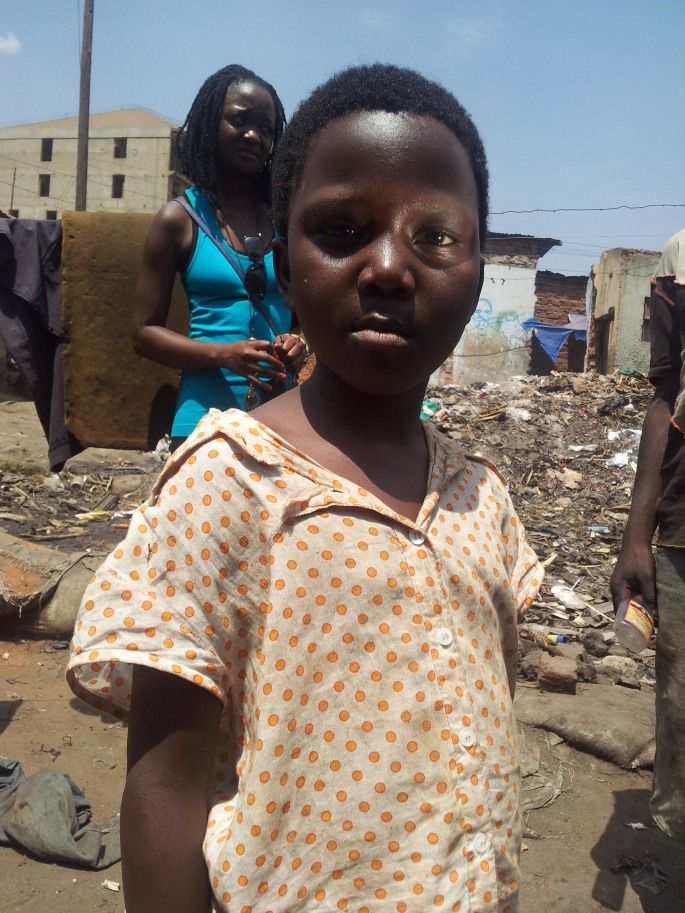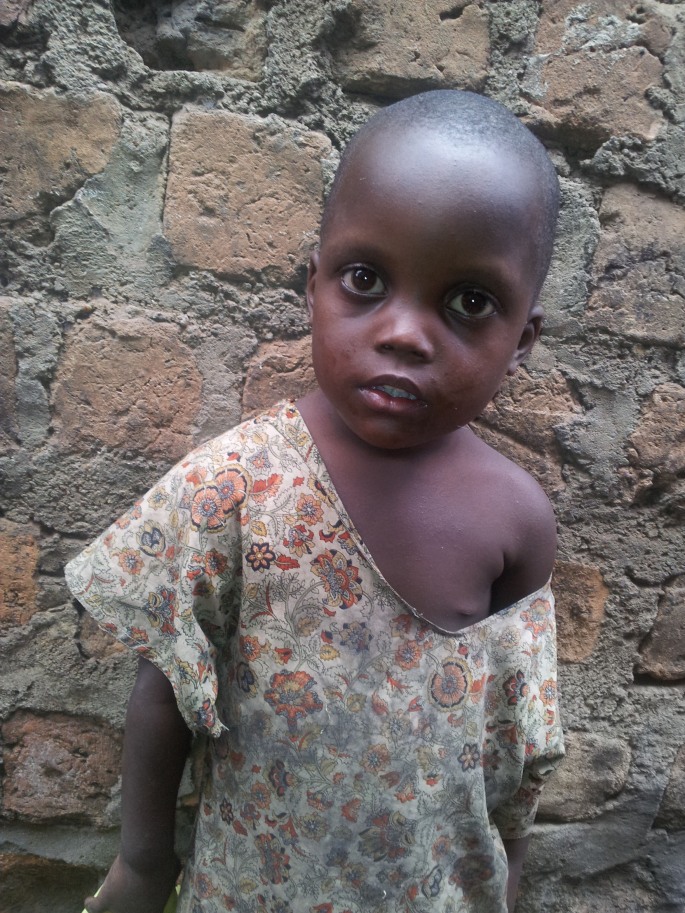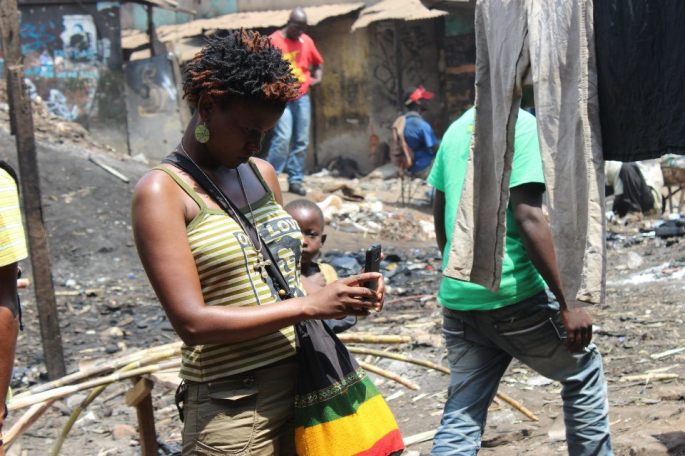Right in the middle of down town Kampala is a slum called Kisenyi. It’s a place with a mix of many language spoken in Uganda, Eastern Congo, Tanzania, Rwanda, Kenya, Somalia and Ethiopia. The roughest Kampala neighbourhood I have ever been. We visited Kisenyi on Saturday 28th with friends, some of whom I know personally and others through twitter after @AndyKristian called us for a photo shoot. I had only passed by the outskirts of Kisenyi as a journalist. I had never seen anything like that before. In just a few minutes from the crazy crowded bus parks we were in a place where we felt visibly foreign.
It wasn’t long we were moving through the garbage, heaps of polythene bags, flowing sewage besides little wooden houses which most people sleep in. We were with a young man that runs a program for kids in that neighborhood and that’s why it was easy to move around.

Andy and Ed Echwalu were ready with cameras. You can’t shoot without getting the toughest kids on the block to guard you here. Before the shoot, a crowd of kids gathered, it was quite touching to see a child beg you to buy them sugarcane for 100 shillings for lunch. We were there around 1pm, most of these kids don’t easily find a meal. There are all sorts of businesses going on but survival business like selling empty water bottles. More than three quarters of the kids and youth here were intoxicated with all sorts of substances. There were a few women who came to the shooting site. There were lots of young girls too.
I spoke to Angel Nantale, barely five years; she goes to Nakivubo blue Primary school. She told me her mother is a bar tender, her two elder sisters stopped in primary four. The two sell tea in Kisenyi. As we chat, Nantale tells me she wants to be a doctor to the laughs and disbelief of the some boys who were eavesdropping on our conversation.
But Nantale doesn’t even turn to them. I ask her why she specifically wanted to be a doctor and the reply “when my mum is sick I can look after her very well.”Our conversation was in Luganda and English. She says she pays about 70,000 shillings (about 30 USD) but she has a hard time. Sometimes she is chased from school because of late school fees payment especially before exams. I took sometime to tell her that she will be a doctor if she puts her heart to it, she smiles and I am called for the next kid to interview. Nantale and I we part ways.

Most children here lived with their relatives, some ran away from homes. I had never seen such a scene, a group of 30+ children high on different drugs. I wondered how this can be the same city we live in and what was government doing. I spoke to another woman 29 years old, HIV positive and couldn’t afford drugs. She said she had left her home in Rukungiri at 18 after the death of her mother. She came in search of a job in the city.
Then there was Madina, I called her pretty Madina because she has such gorgeous eyes. She’s barely 5 also and she was carrying two three-litre jerry canes to go fetch water. Not knowing how to approach this child labour question, I ask her whether she had siblings. She tells me she has many. I ask why they aren’t fetching the water, she says they were somewhere playing and her mother needed water. We talked and she said the water wasn’t that heavy, and that she was ok, she could bring the six litres at once.

Watching this whole environment I wondered what it means to grow up from here as a girl child. I wondered, would she survive sexual violence in such a drug filled environment? How long did she have before her dreams of school die? Madina told me she had gone to a school once but she was out because she did not have a uniform. Just a uniform stands in the way of her education.
I wondered why would our government boast of a universal primary education if it doesn’t tailor in special needs of kids from tough places like Kisenyi. And what have our local government done in terms of catering for the urban poor especially children. How can a place like this never ever feature in our news? How can hundreds of families never be mentioned much?
And in the end I asked what could I possibly do about this? Some of the youth- the boys wanted money from us. They said the same charges we hear put on “foreigners coming to Africa to take pictures of us and make money from out of our misery.” They didn’t have to say it, I had already started wondering how can I help beyond just being part of a photo shoot organized via twitter which these kids might never hear of?
What can I do to see that Madina, Nantale and others have an education and not simply be part of this cycle of poverty and hopelessness?

Check #KisenyiPhotoShoot on Twitter.

Thank you; Amazing Stories these are: It is kinda hard to actually think that Kisenyi is in the heart of Kampala!
A big thank you for bringing these issues to our attention. Your raise some important challenges that Uganda and perhaps other African countries face- urbanisation and inclusion for girls. My colleagues and I noticed the plight of urban children and one of our desires is to relocate the urban and street children to rural Uganda and provide them with a decent education. Our programme in Ruhanga is coming along nicely and hopefully we can get to a stage where we are able to realise this dream. In them meantime those of you on ground should take some direct action to help such children. A challenge for us all is to reach out beyond our immediate families- I doubt that the government would see this as their role! I stand to be corrected
This is definitely touching. It looks like Kisenyi is “not in Uganda”. But the one question i keep asking myself why the leaders like Members of Parliament who are voted into power by the same such community never address such issues. Thanks for sharing
Organisations like Hands for Hope and Lessons for Life match orphans and kids from the slum with potential school fee donors but that’s just a drop in the ocean – and these kids are the responsibility of the state, not foreign NGOs. To hear of such young kids high on drugs is shameful but what’s the solution? who will address this?
This very interesting and touching, the same qstn pops into my head what can we do the help.
Charlie, we should really be matching these kids with government officials. We need to pressure them to support their countries kids. WE need to be the solution. Matching them with other international NGOs doesn’t change the fact that it is us and our governments that are responsible for fixing this mess.
We have to brake the chain of dependency at some point, otherwise, we won’t even own our own pride and will have to ask someone to help us find it.
To me, that’s the saddest image out of the above. Start at home.
TMS Ruge, I totally agree with you, on all your points. Which govt dept is responsible for these kids? What is local / district council doing?
On a slight tangent, have you heard of The Big Issue? http://en.wikipedia.org/wiki/The_Big_Issue Started in the UK, it’s a newspaper sold by homeless and marginalised people. I believe it’s published in Kenya now too. Kampala needs something like The Big Issue. Gives people an opportunity to earn – both money and self-respect.
A powerful narrative but trust me,what u saw was just the tip of the iceberg,i had the ‘priviledge’ to closely associate with the residents of kisenyi in the late 90’s and what i saw was not for the faint-hearted.Crime,Sex,Drugs and u probably forgot to notice that it is a bit curious that the somali run the show in that part of Kampala,they own the petrol stations,the internet cafes,the homes,mosques and even the retail shops there.I find that peculiar.
Great work. Very touching story, wish we can write more and more about Kisenyi and the like to bring the plight of such population to leaders’ attention
Powerful Story. Madina’s story especially (listening to her personally) was such an encouraging one. She’s courageous, bright and but didn’t have the opportunity to follow her dream.
Wonderful!most of us go there but unfortunately we don’t observe the hardships faced.Am challenged.
Ur article has made me realise the political leadership game in uganda. Can t imagine mps going to kyankwanzi to ful there stomarch and bank accounts forgeting serrious issues like that. When wil these stop, we real need to take action before this rotten government spreads its smell to all of us. I have liked that article keep it up. We shall work together to over come it. No condition is permanent that wil end.
I agree with u daniel.
Hello Rosebell! I love your article, very interesting. I work for a charity called Abaana – we’re based in Northern Ireland but primarily work in Uganda, building schools, sponsoring children and working with street kids. I’ve been to Kisenyi and it is a harrowing sight indeed.
Part of our ministry is working with the kids from this slum. If you’d like to get involved or even just to see what we do let us know and we can help make that happen!
Thanks
Roger
Look for me up on twitter @rosebellk
and stay in touch on the matter
Rosebell,
Do not give up hope when surrounded by hopelessness, if your work influencens just one person’s life then your efforts of fruitful.
This is an indication that the current regime has completely lost focus on Uganda’s development to an extent that such cases exist in the heart of the country’s capital city. Therefore, it is our mandatory role;e to embark on collective effort and responsibility to forcefully redirect the inactive government institutions on development of our country’s economy.
ROSEY,THIS IS TOO TOUCHING A STORY.AM ALSO DOING A RESAERCH ON CHILD LABOUR I HOPE SUCH LINKS STICCK IN MA HEAD.
its not a suprise! we just need to act,and nothing else…..i for one,will remain mouth for the voiceless. fellow journalists join me in the struggle.
Dear Rosebell
This request is more suited as an email rather than a blog comment, but could we use this article as example of good writing? We run a writing WASH professionals and we used this in our first training session as great example of raising awareness of the sort of poverty that is often ignored or only expressed as dry statistics.
There is more information here: http://www.shareresearch.org/NewsAndEvents/Detail/writing_for_WASH_workshop
Keep up the fantastic work!
Thanks a lot!
When I initially commented I clicked the “Notify me when new comments are added” checkbox
and now each time a comment is added I get four emails with the
same comment. Is there any way you can remove me from that service?
Thanks!
will ask abt that. No one else has had that problem. I have no idea but will ask and get back to you. thanks
Rosebell, thx for bringing this out in your own style. I work for a UK charity called Fields of Life here in Uganda. We are basically involved in building schools, sponsoring children (only in schools we build) and also promote income generating activities (parents of these schools). The major issue here is that every thing has been politicized but this people really need a complete make over. Gov’t needs to find out where these people come from then re-settle them but with a tart up project. This is now a lifestyle for them despite the hardships faced and of course coupled with fear of starting a fresh. Otherwise gov’t needs to erase such slums but after giving well planned and sustainable projects.
thats how we leave and its like no one seems to care. this place is in the middle of kla for crying out lound.
Hello I’m trying to find out what I can do to help these poor children in anyway I can there must be something more we can do to help can someone plz inbox me some info I’m already collecting toys and clothes but have no clue how to send these things thank you xx
Am a student at muk doing research about urban porvety but shade tears wen ever i go down there still failed to complete my report
its so terrible that even when our leaders have seen what is happening they dont even bother to take action. so pliz why wait for them let this be a joint problem to everyone in our soceity thank you ssozi javie for exposing this to the world more so in photographic images